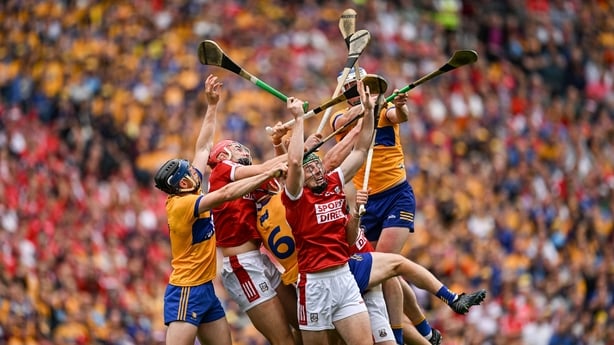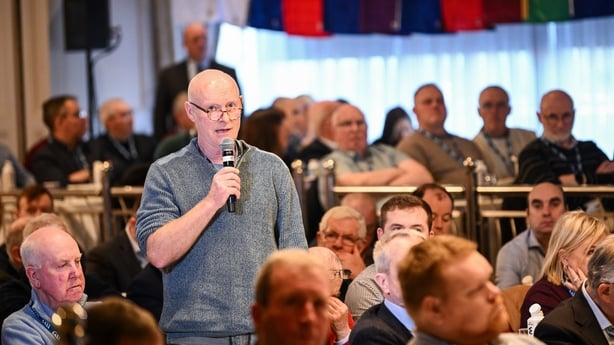The All-Ireland senior football championship will have a new format in 2026, with the group phase abolished and replaced by a qualifier-style series.
GAA Congress approved the proposed changes to the football championship format, with a whopping 92.8% of delegates voting in favour.
The All-Ireland SFC group phase, in place since 2023, had been widely criticised for a lack of perceived jeopardy, with three out of four teams allowed progress to the knockout phase.
The new format will see the eight provincial finalists and the next seven teams as per league ranking, along with the Tailteann Cup winners, drawn together in the first round for the Sam Maguire Cup.
The eight provincial finalists would be drawn at home against one of the other eight, with the eight winners progressing to round 2A, where they would be drawn against each other, producing four winners that would progress to the quarter-finals.
The eight first round losers would pair off in round 2B to produce four winners, who would then be pitted against the four round 2A losers in round 3. The four round 3 winners would then complete the quarter-final line-up.
The draws would be subject to avoidance of provincial final pairings and ties from previous rounds, where possible.
The vote means that the 2025 All-Ireland football championship will be the last played under the current format.
The 2025 All-Ireland finals will incorporate extra-time, after a motion proposing that All-Ireland deciders go straight to replays after full-time was withdrawn following a spirited debate.
In addition to proposing that All-Ireland finals go directly to replays, Motion 3 also stipulated that provincial finals would not be decided on penalties, with games going to a replay should both teams remain level at the end of extra-time.

Cork, beaten in last year's All-Ireland hurling final following extra-time, said they favoured the change to enable All-Ireland deciders go directly to replays but were opposed to provincial final replays. Donegal, by contrast, victors in last year's Ulster final penalty shootout, were in favour of the change, with chairwoman Mary Coughlan arguing that provincial deciders would not be decided on penalties.
Earlier, a proposal requiring players to play four club league games before being deemed eligible for inter-county duty was withdrawn at the request of President Jarlath Burns.
The high-profile motion had been championed by former Dublin footballer Noel McCaffrey and sought to re-organise the calendar into four seperate blocks.
The first would be the league, where the football and hurling national leagues are played on alternate weekends, with club football league games played on the same weekends as county hurling and vice versa for club hurling games.

After the league finals, there is a four-week block for club championships, followed by the inter-county championship over 13 weeks where inter-county players are exempt from club championships which continue parallel, with the final block the conclusion of the club championships over six weeks.
The motion - which was met with opposition on the floor by Cork and Galway - was withdrawn on the request of Jarlath Burns, with a view to tabling it again in an amended format next year.
The motion to reform the hurling handpass has been rejected, with over two-thirds of the delegates voting against the proposal.
The proposed rule, championed by former Tipperary defender Conor O'Donovan of the Nenagh Éire Óg club, stipulated that a player could no longer handpass using the same hand with which he was carrying the sliotar.
To execute a legal handpass under the proposed rule, a player would have to release and strike with the other hand without dropping the hurl, or else bounce the ball off the hurl and strike with his original hand.
However, the motion was rejected by a comfortable margin, with 67.6% of delegates voting against the proposal.
Meanwhile, the motion which sought to make it mandatory for every club to field hurling teams between U7 and U10 was also withdrawn, with its proposer Liam Griffin saying he was happy for the Hurling Development Committee to take the lead on the matter.
Two motions intended to strenghten the hand of disciplinary bodies in imposing penalties passed easily, with committees now given the discretion to enforce additional suspensions for category III or category IV infractions. They will also have the leeway to levy an additional one match suspension for hearings (appeals) deemed to have had no prospect of success or been an abuse of process.
The New York hurlers will compete in the Lory Meaghar championship, with 76.8% of delegates voting in their favour.
A motion from Danesfort in Kilkenny proposing that GAA clubs permit other sports and community groups to use their facilities earned the support of a majority of delegates but failed to reach the 60% threshold.
The Sligo motion proposing to dispense with the stipulation that clubs can only propose changes to playing rules every five years fell narrowly short of the 60% threshold.
Currently, clubs can only table playing motions every five years, with the Cloonacool club in Sligo proposing its abolition.

